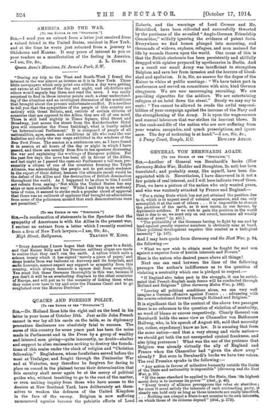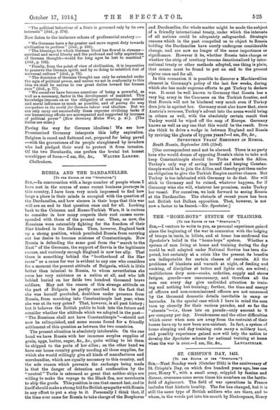GENERAL VON BERNHARDI AGAIN. [To THE EDITOR Or THE "SPECTATOR. " ]
SIR,—Another of General von Bernhardi's books (How Germany Makes War, Hodder and Stoughton, 2s. net) has been translated ; and probably many, like myself, have been dis- appointed with it. Nevertheless, I have discovered in it not a few points of real interest, and I will here indicate two of these. First, we have a picture of the nation who only wanted peace, and who was wantonly attacked by France and England:— "For a rising State which has not yet attained the position due to it, which is in urgent neod of colonial expansion, and can only accomplish it at the cost of others . . . it is impossible to change the partition of the earth, as it now exists, in our favour, by diplomatic artifices. If we wish to gain the position in the world that is due to us, we must rely on our sword, renounce all weakly visions of peace " (p. xiii.).
" The probability of the Germans having to fight by sea and by land against greatly superior numbers is obviously near at hand. Their political development requires this combat as a biolcgical necessity" (p. 147).
And I may here quote from Germany and the Next War, p. 84, the following :- " What we now wish to obtain must be fought for and won against a superior force of hostile interests and Powers."
Here is the nation who desired peace above all things !
Next one can read between the lines of the following passages the author's indifference as to the question of violating a neutrality which one is pledged to respect :— " If England also takes part in the struggle, it can be antici- pated that French-English main forces will be conducted through Holland and Belgium" (How Germany Makes War, p. 183).
"Leaving all political conditions alone, we can very well imagine a German offensive against France . . . advancing with the armies echeloned forward through Holland and Belgium."
It is significant that in the context of the above two passages there is no reference to the question of violation of neutrality, no word of blame or excuse respectively. Clearly General von Bernhardi holds the same view as Chancellor von Bethmann Hollweg, who, in his speech of August 4th, said that necessity (or, rather, expediency) knew no law. It is amazing that from the same nation—and that a very strong and virile nation— we should get both the not unexpected cynical frankness, and also lying pretences ! What was the use of the pretence that Belgium was already virtually the ally of England and France when the Chancellor had " given the show away " already P But even in Bernhardi's books we have two voices. The real Prussian speaks in the following:- " Any action in favour of collective humanity outside the limits of the State and nationality is impossible" (Germany and the Next War, p. 25). "If the same standard be applied to the State, then 'its highest
moral duty is to increase its power "' p. 46).
" Every treaty of alliance presupposes the rebus sic stantibus ; for since it must satisfy the interests of each contracting party, it clearly can hold only as long as those interests are really benefited. . . . Nothing can compel a State to act counter to its own interests, on which those of its citizens depend" (ibid., p. 272).
The political behaviour of a State is governed only by its own interests " (ibid., p. 274).
Now listen to the insincere echoes of professorial oratory :-
" We Germans have a far greater and more urgent duty towards civilization to perform" (ibid., p. 258). "The blessings for which German blood has flowed in streams— spiritual and moral liberty and the profound and Lofty aspirations of German thought—would for long ages be lost to mankind" (ibid., p. 105).
"Finally, from the point of view of civilization, it is imperative to preserve the German spirit, and by so doing to establish foci of universal culture" (ibid., p. 78). " The dominion of German thought can only be extended under the iegis of political power, and unless we act in conformity to this idea we shall be untrue to our great duties toward the human race" (ibid., p. 77).
" We ourselves have become conscious of being a powerful, as well as a necessary, factor in the development of mankind. This knowledge imposes on us the obligation of asserting our mental and moral influence as much as possible, and of paving the way everywhere in the world for German labour and idealism. But we can only carry out successfully these supreme civilizing tasks if our humanizing efforts are accompanied and supported by increase of political power" (How Germany Makes War, p. xi.). (The italics are mine.)
Paving the way for German idealism I We see how Prussianized Germany interprets this lofty aspiration.
Belgium is razed and flattened out, prepared for being paved —with the gravestones of its people slaughtered by invaders who had pledged their word to protect it from invasion. Of the two Bernhardis, one prefers the brutal but honest
worshipper of force.—I am, Sir, &c., WALTER ',ARDEN.
Cheltenham.



































 Previous page
Previous page